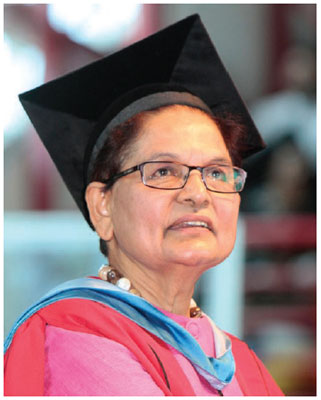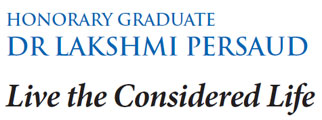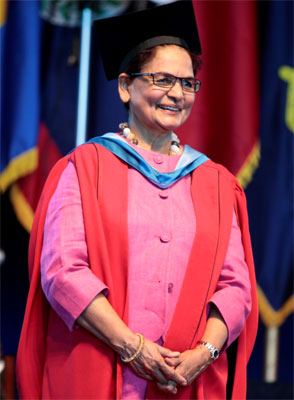 |
 |
 |
|
December 2013 |
We have gathered here today in these pleasant surroundings to honour our graduates and to acknowledge the valuable contributions made by their parents, primary and secondary school teachers and lecturers of UWI. Those of you who have not done as well as you had hoped, it is important that you do not let this degree define you for the rest of your life. However, you will need to reflect on what was wanting in how you organised and prepared yourselves. Sometime ago, a young man graduated from Bangor University in Wales, not with an honours degree, but a pass degree; afterwards, he settled down and worked hard, to discover the true measure of himself. This young man was the late Sir Robert Edwards FRS, Cambridge Professor and Nobel Laureate. Remember this tale, it speaks to us all. We can change the outcome of our lives. You may know of other exemplary cases of achievements here on our islands.\ To those who have attained the highest accolades, we congratulate you most warmly; your achievements could not have been made without the discipline of focussing on your work. Today, you stand tall. However, be aware of swimming too long in the flow of excessive pride and so hubris; the Greek gods are observing you. Look at your achievement dispassionately. There are many fields of endeavour, you have been examined on one; your exam was based on a part of that subject whose very parameters are still being extended and shaped. This is especially true of the Social Sciences, for human behaviour—its pivot—is complex and we are at the infancy of understanding ourselves. If you are fortunate and you’ve obtained both a good degree and a well-paid job, you ought not to feel that you’ve been educated and have arrived. To be educated does not merely mean having the skills for a particular task. When can you say that you’re educated? The philosopher AC Grayling in his book, “The Meaning of Things,” offers this understanding: “Education proper opens the possibilities for us to live more reflectively and knowledgeably. It is the process of learning to think, to know how to find and use information when needed. Education involves refining our capacities for judgement and evaluation.” It’s a vital tool in living the good life, the considered life. There are important, troubling concerns on our small twin-island state that can only be solved if we are governed by those who are truly knowledgeable and dedicated to the betterment of the quality of life of us all, and not to narrow political interests. In crime, our statistics place us high in the global league table. For too long we’ve held that place. Secondly, the Caribbean has been going through a relative economic decline for quite some time now. Many countries have moved well ahead of us. We have allowed ourselves to be cradled by the natural resources of oil and gas, which in time will be depleted. It is an undisputed fact that exporting to the wider world is the key to development, especially for small states. This means we have to work hard at becoming internationally competitive.
Thirdly, we are a multicultural society. Thankfully, we are entering a more rational and post-racial stage in our governance and inter-personal relations that would serve national interests, and not those of any particular person or group. Fortunately, we are at last realising that if politicians know they will not be held accountable at the ballot box for their performance, they have no incentive to govern wisely and so the unconditional support given to them will continue to be exploited ruthlessly at the expense of their supporters and therefore to the country as a whole. Fourthly, it is understandable that at the early stage of our independence we have been inward looking, trying to develop an identity, to cohere our different cultural backgrounds. But now, at our mature stage, we must be looking outwards, as Steve Jobs, the co-founder of Apple did, and found success. Ewan Clayton in his book, “The Golden Thread,” wrote that Steve Jobs noted “that great products are a triumph of taste and taste happens by exposing yourselves to the best things humans have done and then trying to bring those same things into what you’re doing.” With Job’s observation and success in mind, were we to expose ourselves to the wisdom of all civilisations, we will produce work of good taste and which the world will wish to purchase as Steve Jobs has shown, for we too can create intricately designed products. We are fortunate that part of our inheritance is the English language which is the nearest thing to a world language. However with a West Indian flavour and colour, we will have a rich West Indian English in much the same way as there is an Australian English, a Canadian, American, an Indian, a London English and many more variations in shape and tone. Like English, in England, West Indian English should continue to be held on a strong foundation of grammar and syntax and should have no rule-making authority, as is in France; nevertheless, its guardian could be our University through its linguistic study and research; for nothing stands still, over time we either improve or deteriorate. I mention this because we need to avoid speaking carelessly, lazily, inexactly or imprecisely and brusquely, with an underlying challenging or tendentious tone. We should avoid speaking with certainty where a more nuanced language is much nearer the truth as is often the case. This cultural miracle of language, its spoken and written forms, we need to respect and honour. We need to share in its beauty, its power to civilise our thoughts. Whatever the level your education may be, disciplined, beautiful, refined and measured language will bring humanity into communicating, so transforming it into a more enriching and fulfilled experience for both speakers and listeners. Graduates, I hope you appreciate why refining your capacity for judgement and evaluation are essential tools to have when you also face the World Wide Web, where much that is both positive and negative are available instantly. T.S. Eliot reminds us that “one of the functions of education is to help us escape from the emotional and intellectual limitations of our time.” The human spirit can be strengthened by the educating process at its best; we do have a good education system and should continue to improve on it. UWI, at its pinnacle, is one of the gems of this region. I wish all the citizens of my country the very best that life can possibly offer. May we all be embraced by the beauty of integrity and the zeal to learn, which is another way of saying: by the beauty of life itself. Thank you for listening and for your patience so graciously given. This is the address given to graduates of the Faculty of Social Sciences, UWI, St Augustine, on October 25, 2013.
|




 We are a creative people; look at the craftsmanship, skill and imagination that go into creating carnival costumes, Indian ceremonial designs, erecting the Hosay, and in composing music, as well as the ingenuity in devising a new musical instrument. Such achievements indicate that at our education levels, we can export globally.
We are a creative people; look at the craftsmanship, skill and imagination that go into creating carnival costumes, Indian ceremonial designs, erecting the Hosay, and in composing music, as well as the ingenuity in devising a new musical instrument. Such achievements indicate that at our education levels, we can export globally.